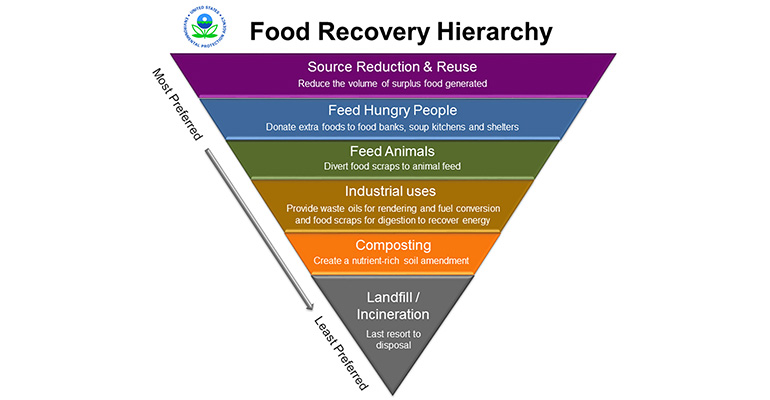Restaurant Equipment Liquidation & Restaurant Supply
Stop Food Waste Day - Main Auction Services
Organics Recycling - Stop Food Waste Day Was April 24, 2019
What is Stop Food Waste Day? A special day for individuals and businesses alike who have set a goal of not wasting anything for an entire day. And, why is it important to you as a restaurant owner? Main Auction Services, your premier restaurant equipment liquidation company spends a lot of time in the education process about food, policies, procedures, trends, new products, and even the celebration of special days throughout the year that are related to topics that restaurants, and management agree on that are of major important in the culture and community where you serve your dining patrons. While our main purpose is to provide commercial kitchen equipment, and restaurant liquidation by weekly auctions, it is also the mainstay of our business model; offering new and used restaurant equipment for sale.

One of the biggest issues our country faces in the environment is recycling. It doesn't really matter whether it's in someones home or business like a restaurant, we all can have have food that may be wasted. The issue is to prevent food waste in the eyes of many across the nation and this article is dedicated to the promotion of stopping food waste where possible.
One of the latest articles by Ryan Cooper (credentials below) invigorates organics recycling with some startling facts you may not be aware of. Harvard Law School’s Food Law and Policy Clinic and the Natural Resources Defense Council released some daring stats. In this report they estimate that up to 40% of all food produced in the United States (approximately 1.3 billion tons) is lost or wasted every year. This is an astounding amount of waste. Meanwhile, Feeding America estimates that one out of every eight Americans, or more than 40 million people, is food-insecure (almost 13 million of whom are children). According to the Food and Agriculture Organization , each year consumers in wealthy countries allow almost as much food to go to waste (222 million tons) as the entire net food production of sub-Saharan Africa (230 million tons).
If you feel overwhelmed about these statistics, you aren't the only one. And while these statistics could make the most optimistic among us waver, there is cause for encouragement among the data and we want to tell you more.
Wednesday, April 24, was Stop Food Waste Day. In the strictest sense, this is described as “a day of action and awareness to focus attention on the global epidemic of food waste and the solutions to combat the problem. The main goal behind this awareness campaign is to make individuals and businesses alike aware of their surplus food by not wasting anything for an entire day.
What does this actually mean? This means everything from making a grocery list and taking it to the supermarket so you’re not tempted to pick something up that you don’t have a plan for, to making sure you chop up and serve every inch of a vegetable, to, of course, finishing everything on your plate. Preliminary things that must already be in place in order to meet this goal is that
source reduction must come first.
The greatest challenge and opportunity for food waste is source reduction. While composting is important — we’ll get into more details on this — when your business reduces the volume of food it produces or purchases in the first place, composting gets that much easier. This has the additional benefit of saving your business money.
The Food Recovery Hierarchy, developed by the Environmental Protection Agency (EPA), is designed as an inverted pyramid that clearly prioritizes the different actions that a business or individual can take to ensure that they prevent and, when not preventable, convert, wasted food to its highest possible use. Find Out More Now and this url will convey topics that will be interesting in meeting these goals.
With each tier of the Food Recovery Hierarchy focusing on a different strategy for managing food waste, this top-down approach shows that the highest tier in the food recovery pyramid is source reduction — the act of reducing the volume of surplus food being generated in the first place. The Food Recovery Hierarchy prioritizes actions organizations can take to prevent and divert wasted food. Each tier of the Food Recovery Hierarchy focuses on different management strategies for your wasted food.
The top levels of the hierarchy are the best ways to prevent and divert wasted food because they create the most benefits for the environment, society and the economy. Click on the links below to learn more about the tiers of the hierarchy. To find out more about meeting recycling goals for your restaurant, please find out more here:
Organics recycling opportunities in your restaurant may take on many faces. If only certain things can be initiated at first, this is a beginning. While this may be a challenge to take up, it also presents an opportunity that you can begin for your restaurant today. Businesses can educate their employees, and themselves, on how to best deal with their wasted food and other organics to ensure they’re being separated correctly. It is also true that if your waste and recycling plan doesn’t currently offer organics recycling, find out if another company can pick these materials up for you and you can go a long way toward helping in your community as well as be a great example.
Be very aware that new and existing technology can also help to improve upon our current organics recycling efforts. For businesses looking to implement organics recycling programs either on a small scale, or across an international footprint, food waste reduction programs can first help you to uncover what you are discarding and assist with things like inventory management, food cold storage and freezer upgrades and more. With data that shows what is left, donation and organics recycling programs can be designed and implemented that keeps these useful resources out of the landfill.
Our hope here at Main Auction Services is use Stop Food Waste Day as a reminder to all of us that the biggest opportunity in organics recycling, as in all other forms of recycling, is source reduction. The less we produce, the less we need to recycle. After that, we need to put in the work to make sure that we educate our employees, and ourselves, on why putting the food we produce toward a beneficial use is so important.
Main Auction Services is committed to helping you get the best products from the top manufacturers in the restaurant and foodservice industry. We buy restaurant equipment and sell your restaurant equipment as well as provide the nations leading brands of commercial kitchen and restaurant equipment to ensure that you have the opportunity to bid on the best quality in refrigeration, furniture, cooking equipment, bar supplies, sanitation supplies, food preparation equipment and dining room essentials through Main Auction Services' online auctions.
1310 West Main Street • Grand Prairie, Texas 75050 • 972-642-0513 2100 E Union Bower Road • Irving, Texas 75061 • 972-579-4612
Ryan Cooper is waste diversion manager and organics recycling lead at Rubicon Global, a technology company that powers a digital marketplace, provides a suite of SaaS products for waste, recycling, and smart city solutions, and collects and analyzes data for businesses and governments worldwide.






